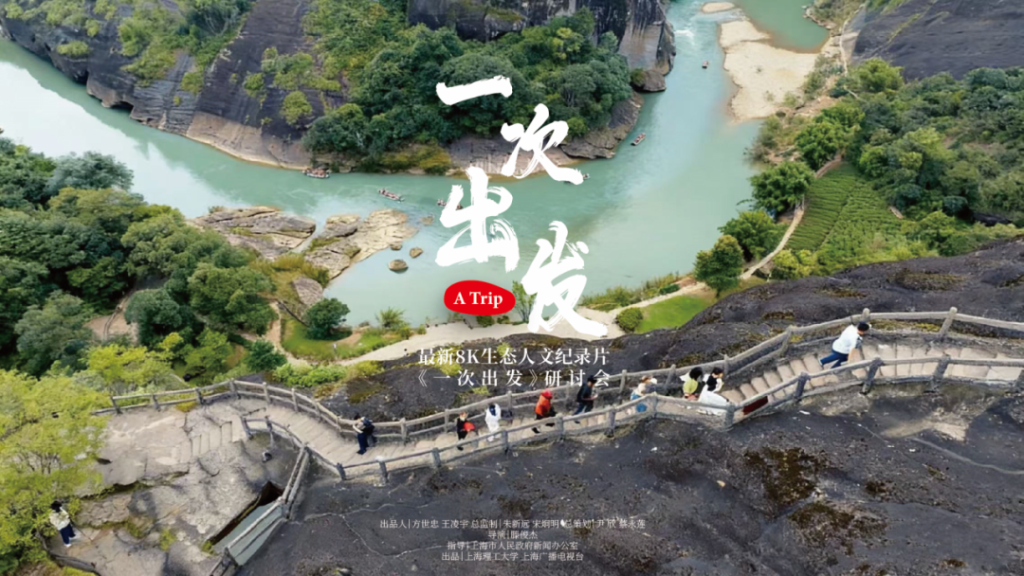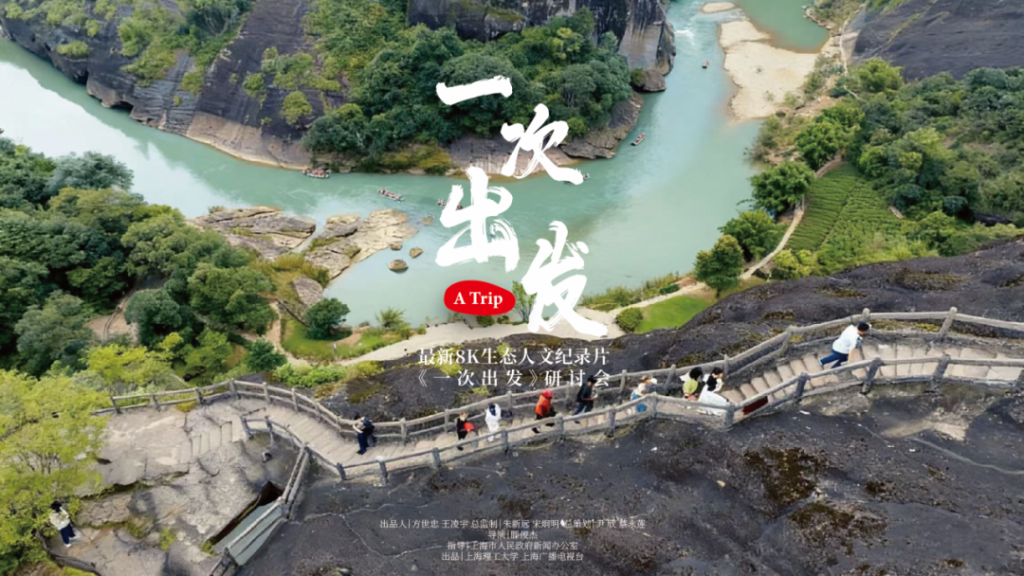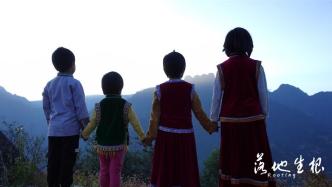
The documentary film "Landing and Rooting", focusing on the four-year poverty alleviation process of Shawa Village, Nujiang, Yunnan, was screened in theaters nationwide on April 20. The film is rooted in the history and reality of Shawa Village, Nujiang, Yunnan. It uses the language of the lens to bring the audience to the forefront of poverty alleviation and watch the earth-shaking changes in the depths of the mountains.
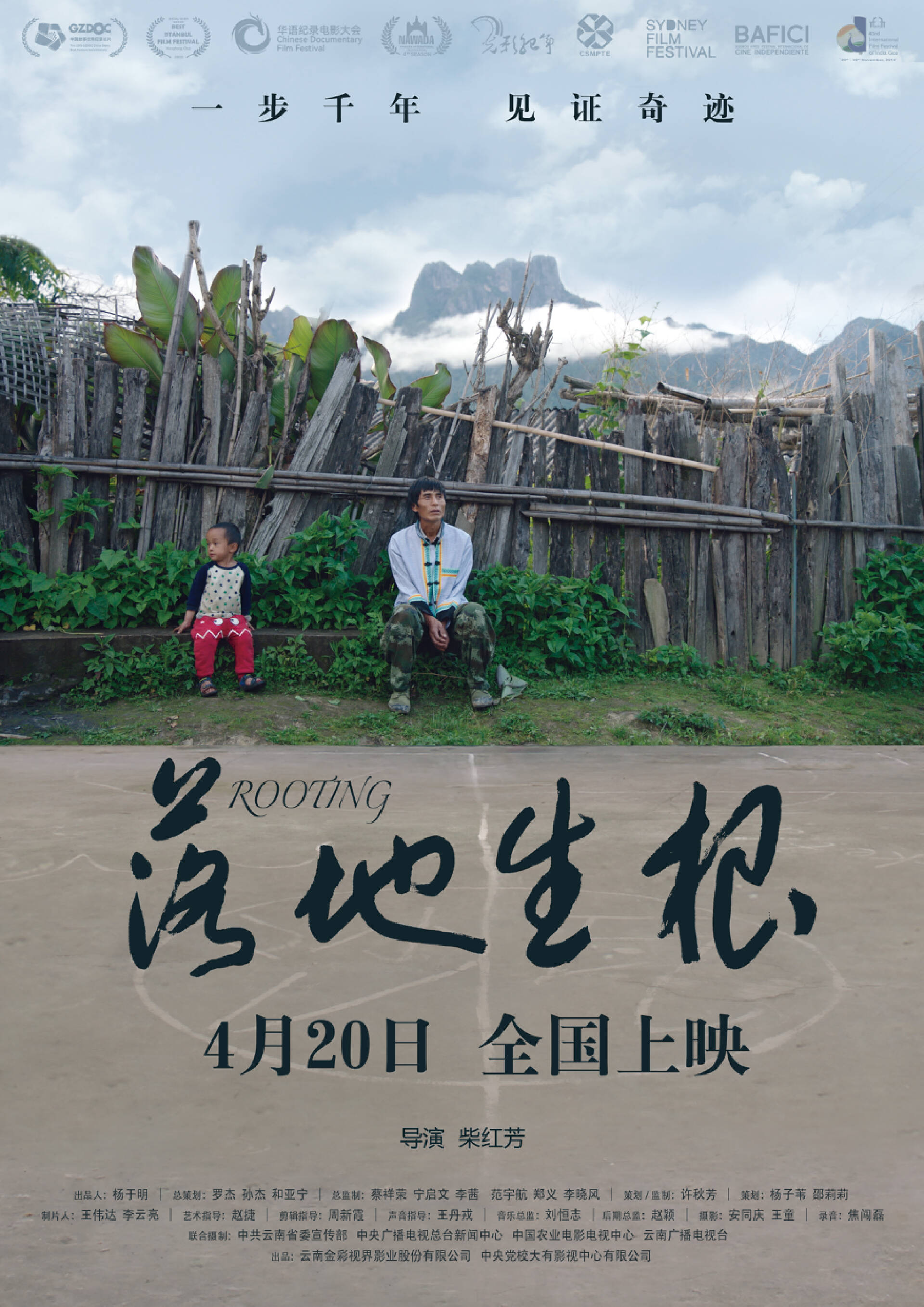
"Landing Roots" poster
The Nu people living in Shawar Village, which has been isolated from the world for generations, belong to the rare "Zhiguo ethnic group". "Straight through the nationalities" specifically refers to the nationalities that have directly transitioned from primitive society to socialist society without democratic reform after the founding of New China. The village where they live is called "Zhiguo Village" and "Zhiguo Village".
"If you say that you want the poor people to get rid of poverty, you must get rid of poverty. It means what you say and take root - it's about the credibility of the government." Above, director Chai Hongfang interprets the meaning of the title in this way.
"Through the screening and publicity of this film, we will play a greater role in changing their fate"
Shawa Village is located in the depths of the Biluo Snow Mountain in the Nujiang Grand Canyon, in the Nujiang Lisu Autonomous Prefecture of Yunnan Province, one of the poorest "three districts and three states" in China. The traffic here is extremely inconvenient. There is only a small mountain road that can pass through the village, and carrying people on shoulders is the only way of transportation. The refrigerator in the villager’s home was broken, and the maintenance worker refused to go up the mountain on the grounds that “I’m afraid to take your Shawa mountain road”. The villagers had to walk for more than 4 hours and carried the refrigerator down the mountain to repair it; The men took turns carrying the stretcher, and carried the patient down the mountain step by step for treatment.
Although life is hard, cows lick their calves, chickens break their shells, sows give birth, big pots make popcorn, brew corn wine, the beautiful scenery of Shawa Village and the simple life of villagers are accompanied by Chai Hongfang's adaptation of local folk songs. The background music allows the audience to unconsciously immerse themselves in the naturally flowing story.
After the screening, a viewer was full of emotion: "I was particularly touched by carrying the refrigerator and carrying the patient in the film. The road in my hometown was only opened in 2017, and it took two hours to walk to the nearest town. The villagers did not use refrigerators. So I never imagined that it would be so difficult to carry a refrigerator in the film. The electrical appliances in the villagers' homes are basically TVs and 'pot covers' (TV signal receivers). Villagers generally don't buy food. The New Year pigs are preserved as bacon, and vegetables are picked immediately Fresh. There is no road, so there is no stone road, and it is dangerous to drive a motorcycle up and down. Patients rarely need to be carried out, except for emergencies such as temporary broken legs."
The film crew was stationed in Shawa Village for 4 years, took more than 1,200 days and nights, and took a total of more than 700 hours of material. In addition to the 114-minute film, six 45-minute investigative episodes were produced.
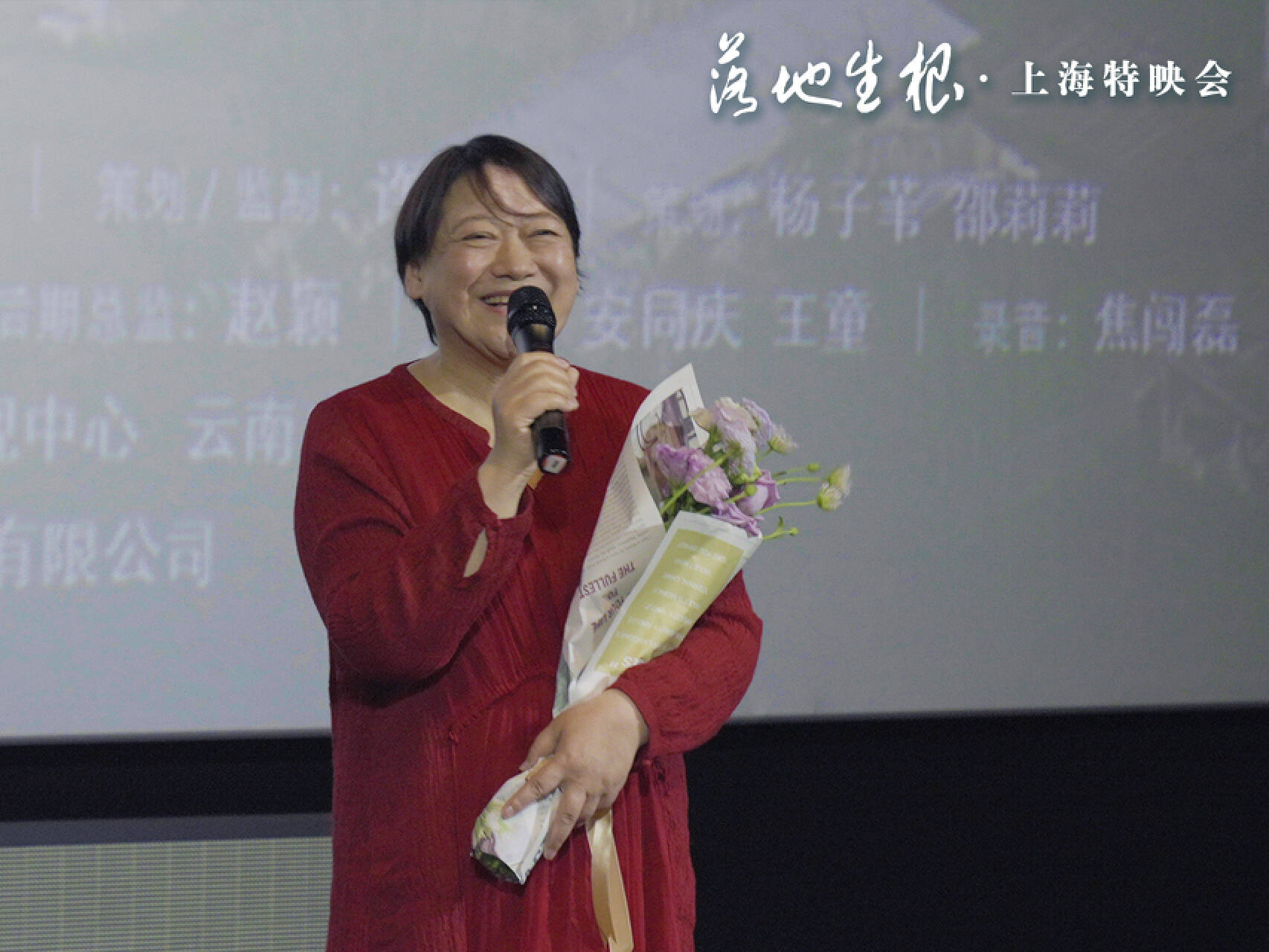
Chai Hongfang, director of "Landing Roots"
At the scene after the screening, Chai Hongfang also said that the hope for this film lies not only in its release, but also in the "butterfly effect" after the screening, "I hope that through the screening and promotion of this film, the production of this village and the people will be improved." Some changes in life can really increase the income of the people on that land and play a greater role in changing their destiny."
Yin Hong, vice chairman of the China Film Association, believes that this film embodies the real power. "It is difficult to present the complexity and diversity of such a major project as poverty alleviation by screenwriting and dramatic presentation. This documentary gives We presented a very rich process and details, provided real cases, and established a video archive of poverty alleviation."
It is understood that the construction of the key highway in the movie was completed by the China Three Gorges Corporation; China Communications Corporation has continued to help 4 counties in the entire Nujiang Prefecture, including Shawa Village, for 28 consecutive years. During this period, we assisted in the construction of many roads and bridges, dispatched more than a dozen batches of temporary cadres, and provided nearly 1.5 billion yuan in assistance funds free of charge. The assistance projects included transportation, industry, employment, education, medical care, and organizational construction. , cultural fields, etc.; Zhuhai City is responsible for the "number one project" of poverty alleviation in the Nujiang River - relocation, and has invested 245.2 million yuan to assist in the construction of 6 relocation sites for poverty alleviation and 4 renovation sites for dilapidated houses, solving a total of 2,618 households with 8,530 people Housing problems for poor people in Nujiang, and promote the pairing of 13 mature communities in the city with 13 large-scale ex situ poverty alleviation and relocation communities in Nujiang; Arrived in Nujiang and started a three-year aid to Yunnan. In just over a year, a total of 570 million yuan was invested, 153 cooperation projects were implemented, more than 6,000 person-times of education and health personnel were trained for Nujiang, and 4 medical centers were established. The establishment of the hospital has realized the wish of the local people to stay out of the county due to serious illness. In addition, nearly 20 local enterprises and units in Yunnan, including Yunnan Daily Newspaper Group, Yunnan Provincial Energy Investment Group, and China National Energy Group Yunnan Electric Power Co., Ltd., have also deeply participated in the construction of the Nu River.
Filming is as difficult a battle as local poverty alleviation
The director of the film, Chai Hongfang, enlisted in the Lanzhou Military Region in October 1986. She graduated from the Journalism Department of the Nanjing Institute of Political Science of the Chinese People's Liberation Army. In 2002, she transferred to the China Agricultural Film and Television Center.
Starting to shoot documentary films in 2005, Chai Hongfang spent 4 years in Shenzhen filming the documentary "Looking for Love", which reflects the love story of the second generation of migrant workers in China. It has gained a good reputation in international documentaries and won the Nomination Award for Feature Film at the 5th Beijing Film Festival , The 39th Hong Kong International Film Festival Shortlist Award, the 2015 "Golden Panda" International Film Festival Social Category Second Prize.
The documentary "Crossing the Mountain" which reflects the Chinese government's care and love for the people in Tibetan areas was filmed at Que'er Mountain, Dege County, Sichuan Province, at an altitude of more than 4,300 meters over two years. The 5-minute documentary news broadcast in the evening news quickly aroused the society's respect and love for the builders.
On May 17, 2017, director Chai Hongfang assembled a filming team composed of 9 people from Beijing and Yunnan, and stationed in Shawanu Village, Pihe Township, Fugong County, Nujiang Prefecture, Yunnan Province. They will stay in this remote mountain village in the southwestern border of China for a long time to shoot a documentary film reflecting China's fight against poverty.
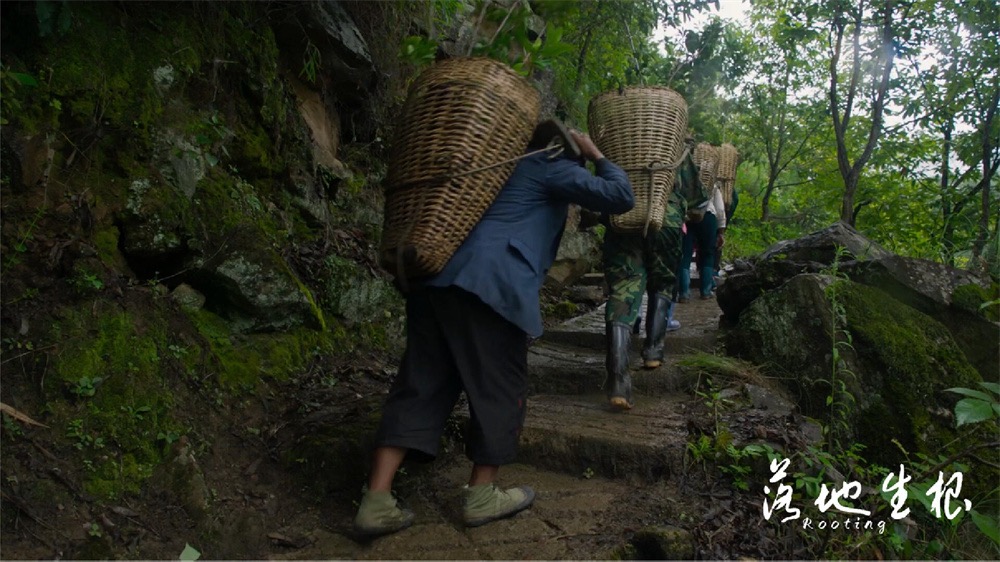
Stills of "Landing Roots"
"Documentary films do not have a script, and they must truly record the entire process of poverty alleviation in this mountain village." Chai Hongfang said that before entering the village, she had prepared for a long-term stay. In her heart, filming is as difficult as the local poverty alleviation. battle.
Before officially stationed in the shooting location in May 2017, Chai Hongfang and her planners scouted locations in Nujiang Quanzhou, and finally they chose Shawa Village, Pihe Township, Fugong County as the shooting location.
Chai Hongfang, who was born in the army, always felt that she was in good health, but she didn't climb up to Shawa Village for the first time.
"Sitting on the way, I really wanted to cry. I didn't expect that there are such inaccessible villages in China." The second time she spent 6 hours climbing to Shawa Village, she didn't complain anymore, and the scene in front of her was swept away. Physical fatigue.
"In the distance, the Huangguan Mountain is misty and misty, and the paddy fields are shining golden under the sun. The children are chasing and frolicking in the village with bare buttocks, and the working villagers wipe the sweat from their foreheads with their sleeves from time to time," Chai Hongfang said. The small mountain village, which is isolated from the world, has beautiful scenery and simple folk customs, is the ideal shooting location in her mind.
Although poor, this is a self-sufficient small village with water and fields. The root of poverty is that there is no way out of the mountain and into the mountain. The scenery in Shawa Village is beautiful, but the living conditions are extremely difficult. On the first night when the filming team entered the village, Chai Hongfang explained to everyone, "If anyone among us wants to quit, he can leave tonight. Those who don't leave tonight must stay and persevere until the end." Talking and doing things Chai Hongfang, who is all vigorous and resolute, issued a military order to each member in this way. "Because the conditions in Shawa Village are too difficult, we didn't shoot here for a month or two, maybe a year or two or even longer. At that time, I was really afraid that everyone would give up and quit, and I really didn't know what to do."
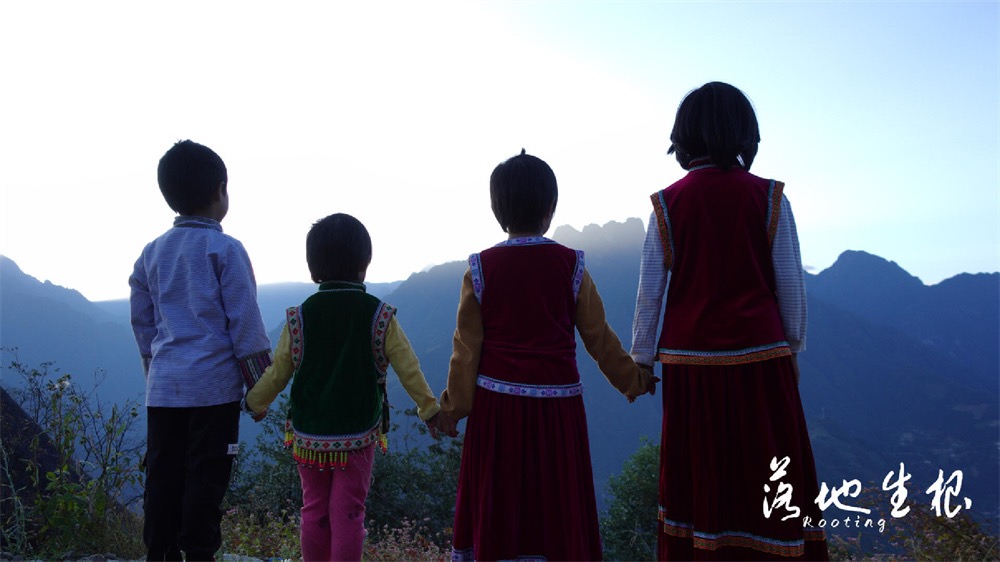
Stills of "Landing Roots"
Chai Hongfang said that leading the team into Shawar Village was the biggest adventure in her life.
"—Ask the abandoned elementary school classroom, three old desks, a few old benches, and a few computers to form our post-production computer room. The team members' dormitory is next to the villagers' pigsty. Didn't everyone wake up every morning to the crowing of cocks? , I was often woken up by the snoring of the sow and the noise of the piglets. In summer, all kinds of bugs would crawl on the walls and beds of the room. In such an environment, everyone had to go through a psychological test.” Chai Hongfang said that the first thing for team members to do when they enter the village is to learn how to adapt to such an environment.
The hardship of the environment is not terrible, what is terrible is that this group of "aliens" cannot integrate into the life of the villagers, "because this place has been isolated from the world for a long time, few outsiders come into the village, and the villagers They were very shy when they saw outsiders. When they first entered the village, they hid or ran away quickly when they saw us, without looking at each other or communicating with each other." Chai Hongfang said that this situation is a fatal obstacle for documentary filmmakers. "All subsequent work will be stagnant, so Chai Hongfang quickly found Adengyan, who is prestigious, educated, and Mandarin-speaking in the village, and told him the purpose of the shooting team's trip. I hope that with his help Next, let the villagers put down their vigilance and cooperate with the filming of the movie.
"I stand on the high platform of the resident every day, and greet the villagers who are working in the fields and passing by. At first, everyone ran away when they saw me. Later, I often invited them to sit with us, and I cooked for them myself. In the past, the villagers got to know us well, and they no longer avoided us, and we quickly got to know their lives, and the key characters in the film were also determined.”
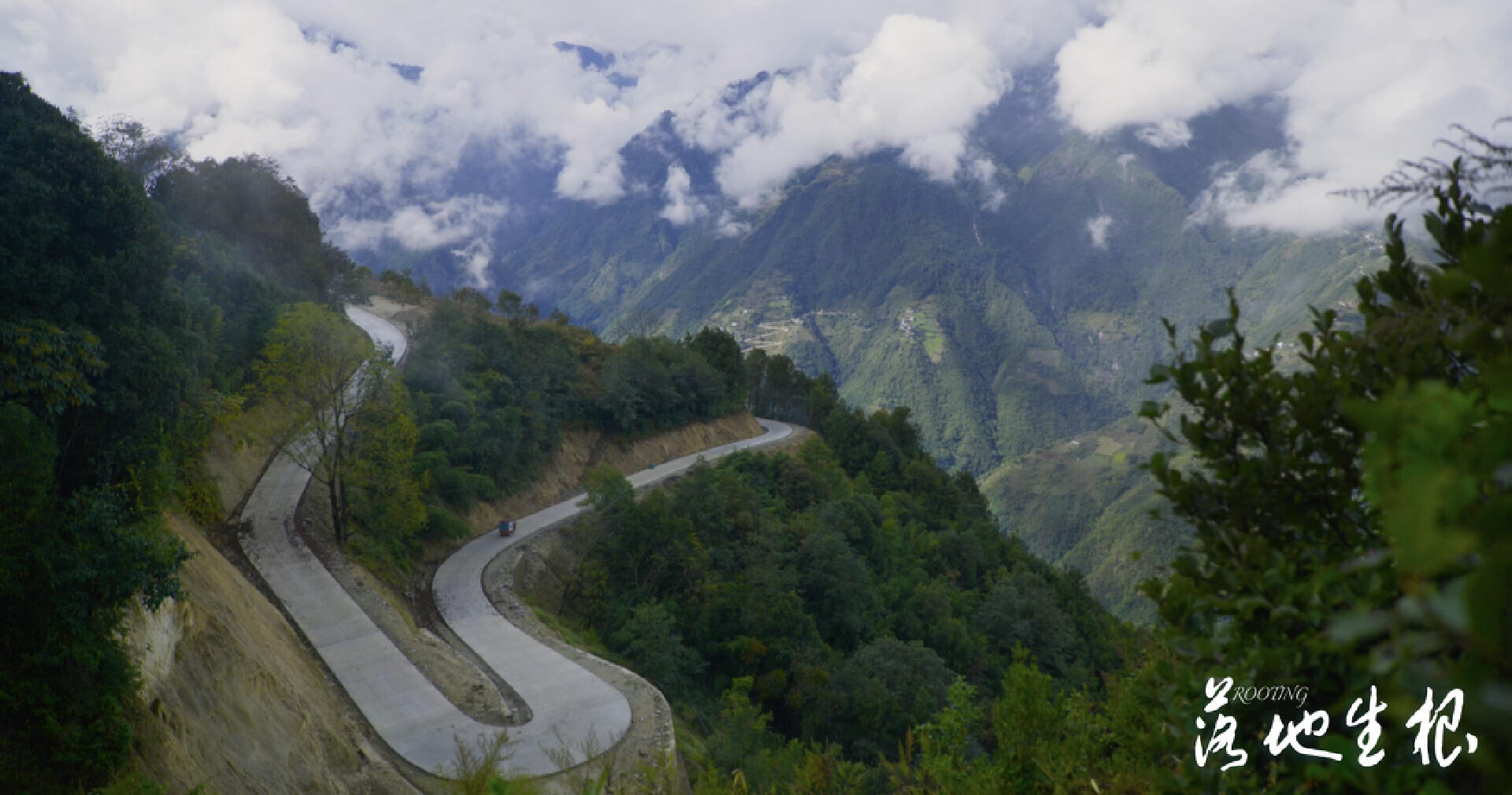
Stills of "Landing Roots"
"The change in the fate of these little people is the change that the fight against poverty has brought to China's 700 million farmers"
"The changes in the fate of these little people are the changes brought about by poverty alleviation to the 700 million farmers in China. Although the characters and stories are small, they represent changes in a group and reflect the profound changes in Chinese society." Chai Hongfang said, these people are In the version of "The Way Out" broadcast on CCTV News Channel and "Landing and Rooting" broadcast on the Documentary Channel, Po Luo and Li Jianhua, poor households with registered cards, Zhu Yun, a poverty alleviation team member stationed in the village, and Laba, the child's representative, appeared vividly and vividly. little people.
During the more than 1,000 days and nights of living and filming in Shawa Village, Chai Hongfang and her filming and production team overcame the physical discomfort caused by the harsh environment, and endured the long-term loneliness and loneliness deep in the heart in a closed environment, and praised it to the audience. But it is a sincere work with dirt, dew, and steam.
"The four years we have been filming in the village are the most critical moments for China's fight against poverty. More than 50 million rural poor people in China have been lifted out of poverty, and the problems of two guarantees and three guarantees have been fully resolved. With the help of the government, in 2020 Shawar The whole village has been lifted out of poverty. This is the significance of telling the story of China's poverty reduction to the outside world." Chai Hongfang said that she is grateful that she and her team recorded this great era of change with real images during this special historical period.
On the day of departure, the whole village came to see off the filming crew. Villagers who were not well-to-do at that time pooled up some money to buy a sheep, some donated a chicken, and some villagers went to the mountains Picked mushrooms and green vegetables.
This moved Chai Hongfang very much, and felt that the villagers really regarded the film crew as a family, and they even called her "Mama Shawa".
"After I left, the children there would often make video calls with me and ask me when I would go back. Rather than filming a documentary film here, it is more like I experienced a life in the chai, rice, oil and salt of Shawar Village. field transformation."
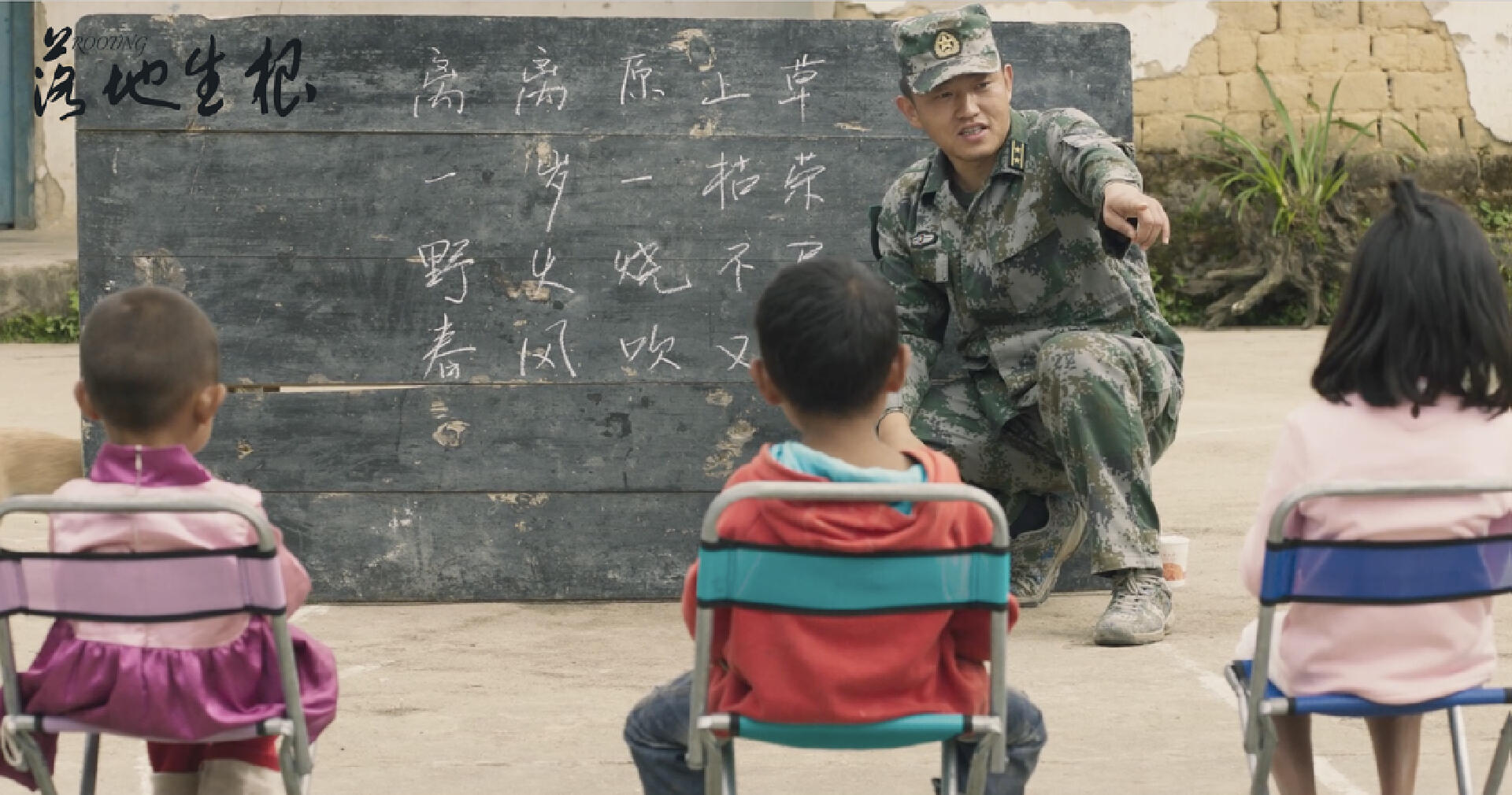
Stills of "Landing Roots"
In the film, the children in the mountains were invited to Beijing to participate in the program because they recited poems. The mother and son of Shawa Village, who had never been out of the mountains, were shocked by the flat plains. The shell was thrown on the ground randomly, and the mother kept crying when she knelt down to clean it up carefully, lamenting that such a good place was dirty by others, this scene touched many people.
Liu Haibo, a film critic and professor at Shanghai University, commented, "This film is the main theme we often talk about, but it doesn't affect its moving in the slightest. What moved me the most was that those children went to Beijing and really experienced the big city and hometown. The difference between. The film presents this point, abides by a documentary director’s respect for reality and truth, and also provides another perspective.” He also praised Chai Hongfang’s persistence and hard work as a documentary filmmaker, “Usually, The directors who shoot these difficult documentaries are very young, and most of them are male directors. I never thought that Chai Hongfang would climb such a high mountain by herself and persist in such a difficult environment for four years.”
The documentary film "Landing and Rooting" was produced by Yunnan Jincai Vision Film Co., Ltd. and Dayou Film and Television Center Co., Ltd. of the Central Party School. Co-produced by television.
At present, the screening of "Landing and Rooting" in hundreds of colleges and universities across the country has started, and there will be "advanced individual sessions on poverty alleviation, rural revitalization sessions, Yunnan-Shanghai cooperation sessions, Yunnan-Zhuhai cooperation sessions, three-region and three-state poverty reduction exchange sessions, and hundreds of village screenings" " and a series of themed screenings. In the future, it will also be screened in countries along the Belt and Road to realize "five continents show together", so that the real story of China's poverty reduction can be seen by the world.
